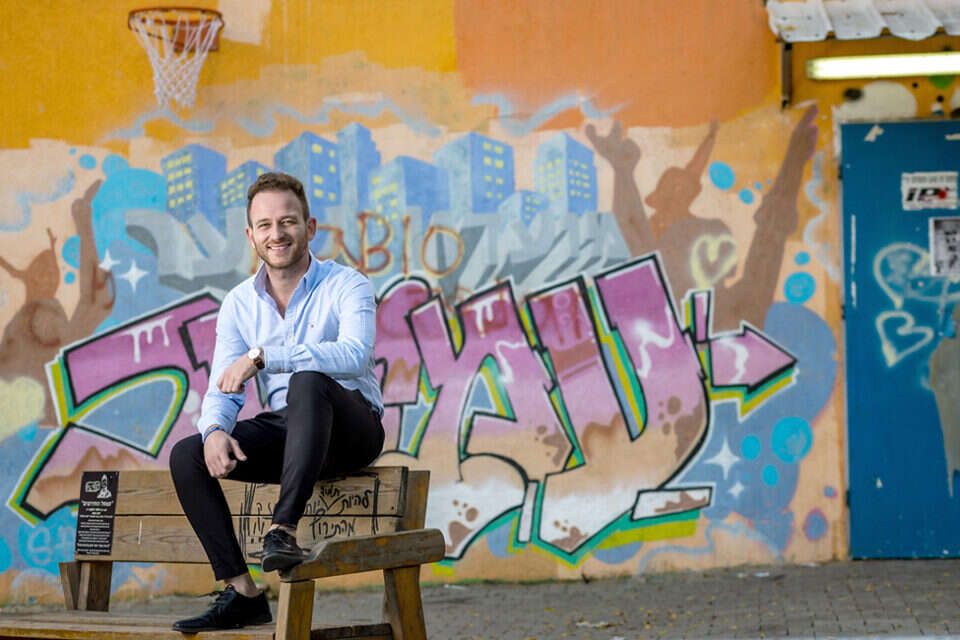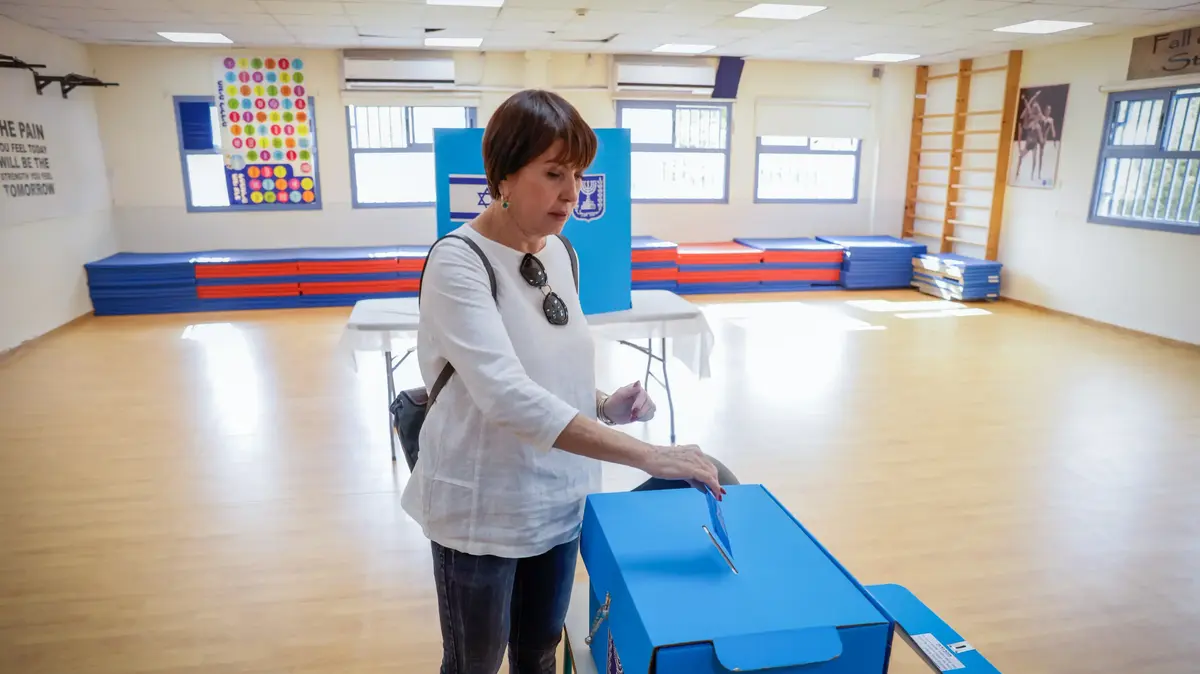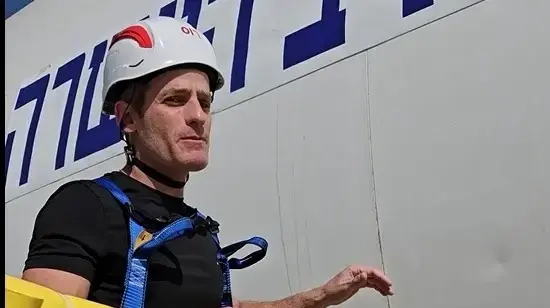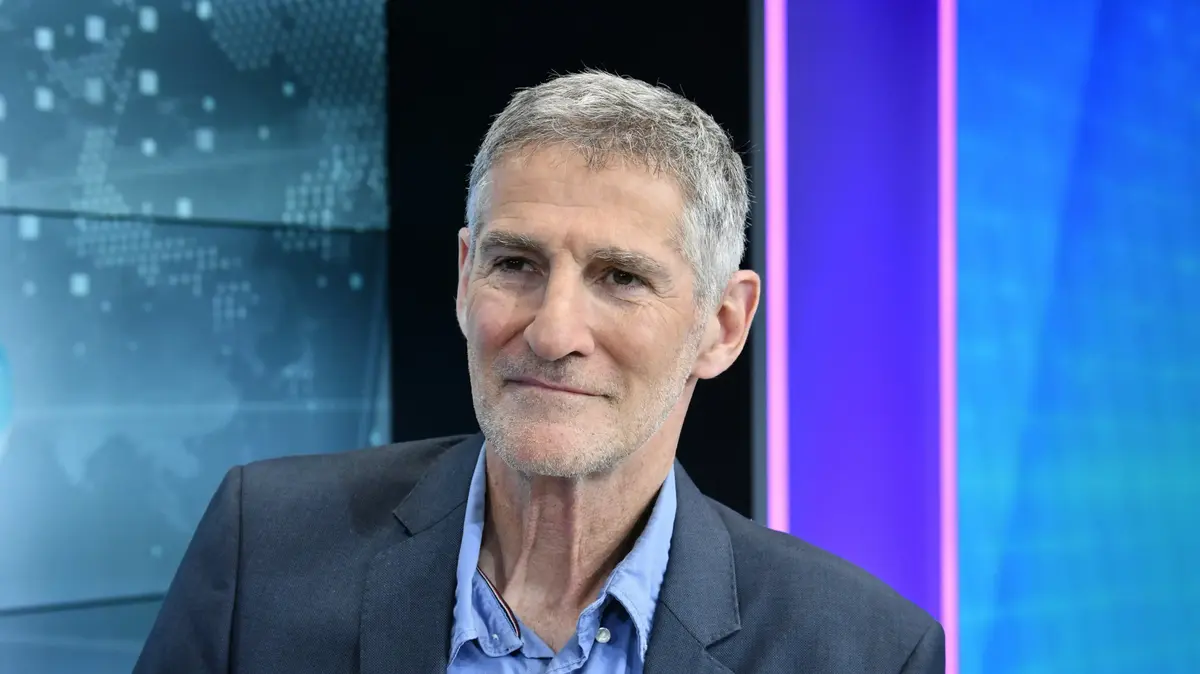For a long time, the chairman of the male and female student union, Elhanan Fellheimer, waited for the message he received at the end of last month.
"Harini shortens the statute of limitations that applies to the conviction of Elhanan Yehuda Fellheimer from September 14, 2017, at the Petah Tikva Magistrate's Court, in such a way that the statute of limitations that applies to his conviction will end on the day this document is signed."
Signed: The President of the State, Yitzhak Herzog.
This is, for the most part, good and long-awaited news.
Although a notice of shortening the limitation period does not erase the criminal record against a person who has been convicted, it limits the possibility of providing information about this record, according to the provisions of the Criminal Information Law and the Return Regulation, and mainly limits the possibility of preventing his employment because of his criminal past.
Indeed, the 26-year-old Fellheimer, who was convicted as a teenager of aggravated assault, has come a long way, to this day - when he holds the president's message and also leads a body that unites about 400 thousand students.
On the one hand, a charismatic leader, the youngest ever chairman of the student union, and on the other hand, the man who was involved last year in the controversial sale, and some called it scandalous, of the shares of the tourism company "Ista", which belonged to the union. A sale at an extremely low price, which drew sharp criticism and a call for Fellheimer to take responsibility and resign from his position.
My impression?
Fellheimer is in for a meteoric rise - or a painful crash.
After all, his life was never easy.
"There are many circumstances in life," he says in our meeting.
"But in the end, three things affect a person: the character he was born with; what his parents instilled in him; and the environment he grew up in. The first point is the most significant. I believe that if someone wants to take control of his life, and it's not easy - he can."
I will admit that at first I was quite reluctant about Fellheimer.
Apparently, before us is another businessman whose lifelong dream is to become a politician.
But precisely these days it is important to hear the representative of the voice of the generation that is said to be spoiled and disconnected.
In this interview, Fellheimer agreed to lay open cards on the table - including from slightly less bright days in his past.
"Within my people I live, and I don't close the month either," he explains.
"My salary in the student union is 9,000 shekels a month, I live with loans. A young student, like everyone else. I am not at a different point in life. And in my opinion, the popular perception of young people in society is wrong."
What is meant by?
"Neither do I come home at eight in the evening and sit down to watch the news on TV. Most of my friends are mainly on Tiktok, Instagram, Facebook and Twitter. Ask young people what the 'break-up period' is, and most of them won't know the answer. If they tried to communicate these things in our language, it would be seen Otherwise, because in the end there is a struggle for most of us to close the month and lead a life. There is no time to think about problems or go out to protest. There is a loss of hope. According to a survey we did, a third of the students said that if they could - they would leave the country tomorrow morning. Where are the parties that talked about Dor The future during the campaigns? These things need to be changed."
You will succeed?
"I'm one year into my position, and I have two more years left. I want to finish when I know that I have done 50 things that will affect the organization for years to come, that will keep it stable for the benefit of the students in Israel. If the association is weak, there will be no one to fight for the young people. People are looking for young people with fire in their eyes, That get up in the morning and look to work. In the past, they used to talk about ideology and vision, and for the most part it remained at the level of sayings. I'm a performanceist."
Your criminal history will not interfere?
"All along the way I am reminded of him. On the day I was elected, a minute later, there was already an article 'Convicted felon elected to the National Student Union'. It was as if it was ready on the shelf. For me, the spotlight is not 'convicted felon', but 'where I was and where I am today.' I was at the bottom of the bottom, and that's what I felt."
"We are a democratic country and if the public thinks it deserves it, then it certainly can."
Deri, photo: Oren Ben Hakon
In your opinion, Aryeh Deri can serve as minister?
"There is a place to look at the person's age. At the time of the act for which I was convicted I was 18 and a month old, so an act that a boy did in his youth should be imposed on a whole life? Where is the second chance that society is supposed to give? There is a place to look at the age and the seriousness of the act."
So Deri can serve as kosher?
"About four hundred thousand people elected him who were aware of what he carries with him. We are a democratic country and if the public thinks he is worthy, then he certainly can."
A minister in the State of Israel who was convicted more than once.
"Every person has a place to make amends, even if it's a sin and a crime. The public is smart and if time and time again the same person is elected, despite everything that happens around him, like Prime Minister Netanyahu who, despite the indictments and the election cycle, the right-wing bloc looks to him as a leader, that's what's beautiful about democracy. The public decided And from the moment he chose, there is no room for intervention whether he can, or not."
Can't a court intervene?
"Among other things. After all, the public knew very well what would happen if Deri entered the coalition and also took into account the possibility that he would serve as minister, so since this is the opinion of the public, he can serve in whatever position is given to him."
Israeli and Palestinian flags at a student demonstration at Ben Gurion University, May 2022. "I want a law - that the national flag be at the entrance to every academic institution", photo: Dodo Greenspan
"I went to school less"
Fellheimer, who lives in a shared apartment in Gani Tikva, is a "good son" by definition.
He comes from a religious home in Petah Tikva, where father Jacob is a lawyer, who previously served as a member of the city council and chairman of the Jewish Home party in the city. His mother, Ronit, runs an association for the needy.
Elhanan is one of the couple's six children, but from a young age he was different from his brother.
"In the third grade I was diagnosed with attention and concentration problems," he recalls.
"The educator told my parents: 'Either he takes Ritalin, or he goes home.'
"All my brothers had an orderly path, and my parents were not used to a child who said 'it doesn't fit.' At home it started to shake. I had a friend with whom I lived most of the time, and we rarely went to school. We would get up at noon and juggle a lot, which would have a few shekels for cigarettes and entertainment in the evening."
What did your parents say in those days?
"To their credit, they kept trying to convince me to get back on track. My mother would call me every night crying 'come back', 'get back to life,' but I didn't listen. Dad warned me a thousand times, 'one day you'll get knocked out,' and I answered him 'You don't understand life. I hang out with my true friends, they would die for me'. Later it deteriorated into soft drugs and a little less good districts. I finished 12 years of school without a high school diploma. I was on a path without responsibility."
In the winter of 2014 came the first slap in the face.
"I was almost 18 years old. We went out to a club on Karlibach Street in Tel Aviv, and at about two o'clock in the morning one of the friends came up and said he wasn't feeling well and asked us to leave. We went in the direction of the taxis in Azrieli Mall. Three guys shouted at us, 'Come on.' He has a feeling that they want to beat us. I asked if he did anything to them, and he said no.
"We continued walking a little more, and they called again. I told a friend that I would talk to them, everything is fine. One of them asked, 'Were you at the club?'
I said yes. He asked my friend the same question, and the friend said no. Then, in response, the same one took out a bottle of vodka from his coat, smashed it on the floor - and cut my friend. I went to help him.
"The friend managed to escape, and I found myself with three people dismembering my face. I will never forget that people passed by on the nearby street and didn't even stop. I somehow managed to escape, and while doing so I called the police.
"The policewoman at the call center asked, 'To send a car?'
And I'm in a panic, 'They're chasing me with knives, in a second I'll be dead'. I happened to see a car passing by on the street, I knocked on its window for help. I ended the night at the police station. I said to myself, 'Elhanan, start asking where you're going and with whom.'"
A few months later he was caught up in another shocking event.
"I was 18 and a month old, and a friend and I were returning from a party in Kfar Saba. On the way, in a taxi, he received a call from a friend of his, who apparently had an argument with someone. My friend said we would continue to a house in Petah Tikva, to help someone. I agreed.
"We got there and met with eight other guys. We went up to the second floor, they knocked on the door, a guy opened - and they just entered his house. I stood at the entrance in shock. I remember he was a big guy, who managed to escape, and they chased him and caught him. I And the friend left. It was a trauma for me, that this is how a person is broken with blows."
Why didn't you intervene this time?
"I was shocked. I didn't know 90 percent of the people there. I knew there was a conflict, but not that they were going to enter a man's house in the middle of the night, when his parents were sleeping. We ran away, and as far as I'm concerned, the incident is over - and everyone is on their way."
Fellheimer did not enlist in the army, according to him due to health problems, but chose national service, as part of his desire to reset his life, as he defined it.
"I went to pre-military training in Elisha, not far from Ramallah. It was the first place in my life where they knew how to accommodate and accept me as I am. I got a sense of responsibility, and there I decided that I would do national service. I felt that for me it would be correction, to work with at-risk youth. I was in Netivot, and after It's in the Amishab neighborhood in Petah Tikva. I felt like I was saving a life."
After he finished national service, he decided to enroll in a pre-academic preparatory school and complete the matriculation exams - at the end of which he would continue to study law.
"While I was studying, one day, at six in the morning, there was a knock on my door and four Yamarniks (central unit officers; AL) came in, 'You are under arrest.' They told me: 'Aggravated assault, conspiracy to commit a crime.' They read a list of sections, and I don't understand how they fell on me.
"We are talking here about the end of 2016, two years after the attack on that house. It turned out that one of the attackers told about the incident and who was present. I arrived at the detention center. On the way I saw many empty cells, and a warden came to put me in a cell full of detainees. I said to him, 'Are you serious? They will release me here , at least put me in an empty cell.'' He told me, 'Come in, come in.'
"A gangster came to me and offered: 'Take it, read Psalms.' When will my house arrest end, because there was an evening when I was invited to a friend's wedding, and my lawyer told me: 'I have news for you, it could take a year.'"
a lot of time.
"I was under house arrest for 11 and a half months until the end of the proceedings, a period that crushed me. I stood in front of the detention judge, Etty Kreif. I will not forget that I choked and said at the hearing that if they had arrested me immediately after the attack - I would have said that I was right and I deserved it. But now, after the rehabilitation, when I volunteered with A youth at risk? After all, part of the goal of the criminal system is to rehabilitate, and here they took a complete reverse. I said, 'I want to be a lawyer. You have stopped me my whole life.'"
After completing his house arrest, Fellheimer was sentenced in September 2017, as part of a plea deal in which he pleaded guilty to an indictment, but did not agree to the sentence.
All he wanted was to avoid conviction.
It didn't help him.
Fellheimer was sentenced to two months of actual imprisonment, served with community service, as well as six months of probation for three years and a fine of NIS 5,000.
The court ruled that although the indictment does not attribute to Fleheimer a specific act of violence, it should not be taken lightly, because his responsibility extends to all events and occurrences that are of a high level of severity.
Therefore he cannot minimize his part and his responsibility for all the acts he and his friends committed.
Fellheimer was conducted during the house arrest under the supervision of the probation service, and received a positive review.
The report states that the criminal process is a deterrent for him, that the risk of recidivism of violent offenses is low, and that there are significant chances of his rehabilitation.
The probation service recommended avoiding the conviction, in light of his young age, his low risk and the assessment that the conviction could block him from future employment opportunities.
Two appeals that Fellheimer submitted to the District Court and the Supreme Court, to overturn his conviction, were rejected.
In his decision, Supreme Court Judge Uri Shoham wrote: "I do not consider interfering with the determination of the previous courts, because the applicant did not indicate 'concrete damage' that will be caused to him, damage that substantially harms his chances of rehabilitation."
"I pleaded guilty to a plea deal," Fellheimer explains now.
"The judge said that even though I did not physically attack, my presence in the attack was in fact a joint one. He made it clear that I should have called an ambulance, tried to prevent it. This is the bottom of the bottom, and more with a conviction."
Students protest against the cost of living, 2011. "There is a big internal combustion here", photo: Roni Shitzer
"I told myself - let go"
The conviction bothered Fleheimer more than the community service sentence he performed at the Gaha Mental Health Center.
"That was the hardest time in my life," he admits.
"In house arrest you are assigned, people don't want anything to do with you. I felt like a year of my life was over. I was at home with my parents, and after two months of detention they agreed that I would go for a walk accompanied by my father, between the hours of 10:00 and 12:00, like a dog. We would go out , I would kiss the trees and come back. I climbed the walls. I would be consumed by accusations against myself and against the whole world and his wife."
Fellheimer ended his house arrest and community service.
Since he had his matriculation in hand, he chose to continue his studies and enrolled in law at Ono Academic College.
"I wasn't sure they would let me become a lawyer. I said I would study, and when we got to the bridge we would cross it in front of the Bar Association. I entered the academy and said, 'I'm starting over, from scratch, and the first people I'll meet will be my friends.' On the first day, even before the lecturer entered, I wrote on the board, 'This is my name, phone number, I'm starting a class group, talk to me.' Within minutes, 250 students had my number."
In those days, there was a system for electing the chairman of the college's student union. One of the contestants, Eli Samuel, wanted to join forces with the charismatic young man from the Faculty of Law.
"Suddenly in the entire yearbook there was no one who did not know Elhanan, and none of them knew anything about my past," Fellheimer says.
"They didn't know I was under house arrest, I felt as if I had moved abroad.
A few days before the elections, in December 2017, I was told: 'You brought enough people.
If we win, what do you want to be?
The CEO of the association? Vice-Chairman?'
I replied that CEO sounds good to me.
"We won, and indeed I was appointed CEO of the association.
A 21-year-old boy, who until two months ago was under house arrest, suddenly manages a budget of four million shekels and represents the largest college in Israel.
It was a positive boom.
I woke up every morning with light in my eyes."
When you move up the ranks, there are always oppositionists looking for skeletons in the closet.
The "Shadow Association of the Ono Academic Library", as it was called on Facebook, put up a post: "Elhanan refused to accept responsibility for his actions and filed a petition to appeal his conviction to the Supreme Court!", it was mentioned there.
"In the appeal to the Supreme Court, Elhanan lied to the court and stated that he was removed from his position due to the conviction, and therefore he was punished and his sentence should be spared and canceled! Perjury to the Supreme Court! In the end, the convicted criminal was thrown from all ranks.
"We turn to Eli Samuel, the chairman of the student union: if Elhanan already understood during the discussion that he might be removed from his position, why wasn't this done?
Is it appropriate that this is the person who will represent the students in Ono?"
Fellheimer now claims that this was a "campaign done on my head. A slap in the face. I never said that I was deposed. I said that my fear was that I would be deposed and that the conviction would harm my public activity. I would sit at home at night and beat myself, I was afraid. I felt that this was the first time that I had something to lose. In the end I said to myself, 'Let go.' So I wrote my own post on Facebook: 'I was convicted of aggravated assault, and so and so, and today I am like this' - and I continued on my own. It was an amazing time."
Fellheimer rode the waves of success and fell in love with politics, including struggles and quarrels.
During the euphoria, he decided, in the municipal elections held in October 2018, to form a youth party and run for Petah Tikva city council.
He was convinced that the achievement was in his hands.
"In the end we got 2,400 votes, when for a mandate we needed 2,900," he says.
"I lost about NIS 100,000 that I took as a loan from the bank. I'll never forget my father telling me: 'If you lose, I won't put a dime to help you, take into account what you're getting into'. And he is indeed not there.
"Then there was a period when during the day I served as student-executive director of the student union, and in the evening I was a waiter in the hall in Jaffa, to cover the debts.
People ate cake at me about the dissonance.
They didn't understand how I could afford to be a waiter as well.
I answered them that I needed the money."
The failure in the Petah Tikva municipality did not stop Fellheimer, who was elected in December 2019 to the position of chairman of the student union at the Ono Academic College. About two years later, he already went big: running for the chair of the Israel Students' Association.
"Me and the national association were less than friends. I was in the opposition," he admits.
"I worked from morning to night. I sat on people's nerves, and my competitors ran a stinking campaign against me. 'Cohenist', 'extreme rightist', 'convicted criminal', 'thug', 'psychopath'. What didn't they say? We won."
A protest by Jewish students during the "Nakba Day" events at Tel Aviv University, May 2022, photo: Gideon Markowitz
Don't play with freedom of speech
Last year, the Student Union conducted a huge survey that included more than 14,000 respondents, and among the questions, issues of employment, expenses, financial conduct were examined - alongside current issues.
Among the findings: the monthly salary of a working student during his studies is NIS 4,967.
22 percent of the students had to take out a loan during their studies.
90 percent of the students are not satisfied with the state's handling of the cost of living.
And 33 percent (a third!) stated in the survey that they are interested in moving to another country after completing their studies.
"If you look at who is studying in the private colleges, it is not necessarily the people of the powerful society in Israel, but guys who came from the periphery and are tearing their ass," Fellheimer explains.
"We have data that break our hearts. An overdraft of about NIS 2,500 a month between what the average student puts in and what he takes out.
"50 percent of the students are helped by their parents in the amount of about 2,000 shekels each month. There are class gaps that are growing year by year. We will fight as much as possible to make the academy accessible, which will be equal, and for everyone to have the tools and abilities to finish it, because there are many who drop out during the degree."
Maybe you will take to the streets like in the social protest in 2011?
"There is a feeling that there is a great internal combustion here, but there are also problems. People, and not necessarily young people, feel that if they posted a comment on Facebook - they have done their part. I talk to a lot of people every day, and there is no hope. As soon as a stable government is established, we can promote reforms. Today, there is no player who knocks on the table and fights for the youth public.
"From our point of view, the focus will be on the state budget, to try and deliver as many things as possible for the student and young public. Also on a legislative level: if it's a discount on property taxes, increasing discounts on public transportation, increasing scholarships. There is a plan we have formulated, and it does not include going out on the streets like in 2011."
In these tumultuous days, it sounds rather sleepy.
"We deal mainly with the issue of the cost of living and reforms that will touch and be felt in the students' pockets. We asked a month ago in a survey to which more than 5,000 students answered, what do they want us to deal with? In first place was the issue of housing, in second place was the cost of living, and in third place was personal security on the campuses. We put these things before our eyes".
It will not remain in the scope of passwords?
"Definitely not. It will be felt both at the public level and within the institutions themselves. It's just a matter of internal organization within us. We held a general meeting of the heads of the student associations, from Tel Hai to Eilat, and there was broad agreement to act on the issue."
Benny Gantz called the crowds to take to the streets. Maybe the fact that you are a right-wing person is convenient for the government?
"The students are not in the political pocket of any party. If they come to meet us, it's amazing. If not, and if we have to knock on the table, we won't think twice. I represent students, that's what I see. There is a real feeling today that the state doesn't see or think about us. No We see long-term plans.
"On a personal level, I have an opinion, but the student community is diverse, and taking a position on the issue, right or left, would not be correct. There are independent student organizations at the current level, against and for what they want to do in the judicial system, and if a student feels the need to join the demonstrations - no one It won't stop him."
"There was a time when during the day I was a student-executive director of the student union, and in the evening I was a waiter in the Jaffa hall, to cover the debts." Elhanan Fellheimer, photo: Eric Sultan
"My Daily Fix"
Fellheimer's financial conduct was heavily criticized last summer, when the student union sold 16 percent of the shares of the tourism company "Ista", which it owned, to institutional bodies for NIS 202 million - a discount of about 20 percent from the market price of the stock.
Many pointed the finger of blame at Fellheimer for managing the failed deal, and there were those who called for him to stand up and resign.
Accountant Ofer Alkalai, who was appointed as an external auditor, wrote that the decision to reduce the association's holding in Ista shares was reasonable and logical, and that Spelheimer acted closely and under the instructions of the association's legal advisor, while complying with the association's regulations.
However, the auditor also criticized: "The analysis of the process shows that it was carried out poorly, in a way that apparently resulted in a higher commission being paid than could have been paid, and more importantly - that the consideration received by the association for its shares is substantially lower than what is accepted in the market."
In this context, Elkalai referred to the professionals who accompanied the transaction.
"I believe in the move a thousand percent," Fellheimer explains now.
"All the student union's eggs were in one basket, and we saw during the corona virus what happened to 'Ista', which decreased in value, which also caused the union's budget to be cut by 50 percent. In order to lead a strong organization, we spread risks, so that we would not be dependent on one board or another."
You received a sharp personal criticism of your conduct.
"True, but the auditor said that everything was done legally. There were those who wrote, 'He received envelopes, corrupt, stupid,' so I'm glad that if anyone had any doubts - he went down. A large part of the criticism I received came from impure places, and that's fine. As a public representative, you are criticized ".
You were told to take responsibility.
"I agree with the move. It is possible that under other circumstances we could have received a better price. We relied absolutely on the support of professionals, and if we do something that would cause us to sue and try to return the funds - of course we will."
Maybe all this comes from your lack of experience, from your young age?
"I have a lot to learn. We are not perfect, and I have learned a lot in the last year."
As mentioned, Fellheimer is a right-wing man, and he does not hide it.
"My predecessors in the position did not fight the boycott of the committee of heads of universities against Ariel University, and when I was elected I made it my goal to stop this boycott - and I succeeded. Ariel is part of the State of Israel.
"מבחינתי, פרופסורים באקדמיה שמתבטאים פוליטית, זה פסול. אני תוקף אותם פעם אחרי פעם. אני רוצה שיעבור חוק שבכל מוסד אקדמי, בכניסה יהיה דגל הלאום, כמו שקורה בארה"ב. תעשה משחק: לך למוסדות אקדמיים ותמצא את דגל ישראל. הדגל צריך להיות במקום בולט, וכל סוגיית דגלי אש"ף שמונפים בקמפוס, או בסמוך לו, למה זה קורה?"
דגלי פלשתין מבחינתך הם מחוץ לתחום?
"עם דגלי אש"ף שהניפו בקמפוסים קיימת בעיה, אבל אם רוצים להניף את דגלי צרפת, זה בסדר, כי יש סטודנטים מכל העולם שלומדים בישראל. כשזה מגיע לקריאות הסתה, זה משהו שלא מתקבל על הדעת.
"אנחנו דואגים לסטודנטים בחברה הערבית, נלחמים בשבילם, לא עושים הפרד ומשול. אבל קשה לי כשמשחקים עם חופש הביטוי. כשנוח אז יש, וכשלא נוח אז אין. לא מזמן סטודנטית יהודייה רצתה להדליק נרות זיכרון לזכר נרצחים בפיגוע, ואמרו לה שזאת פעילות פוליטית, ביקשו שתודיע 48 שעות מראש. זה לא נקודתי, זה מהיסוד. כשהיה טרנד של ציורי רובים על החולצות, פנינו למועצה להשכלה גבוהה ואמרנו 'ייהרג ובל יעבור. מוסד אקדמי לא ייתן לסטודנט להיכנס עם הדבר הזה לקמפוס'".
מה עם טקסי "יום הנכבה"?
"האקדמיה היא מקום להביע בו דעות ולפגוש קהלים שונים עם אמונות שונות. כל עוד מדברים על חופש ביטוי שלא מגיע להסתה כלפי אוכלוסייה כזאת או אחרת, אז כמובן שזה בסדר. אבל לצערי, לא פעם אנחנו רואים בשערי האקדמיה הסתה, ואת הדברים האלה אנחנו מגנים ורוצים להוקיע".
כולל את הקריאות "מוות לערבים"?
"ברור, זה לא בא בחשבון. קריאות הסתה, לא משנה כלפי מי".
Will we find you in the end somewhere in national politics, probably in the right party?
"In politics, I would like to be in places that will contribute to the end citizen, minister of welfare or minister of education. This is my fun, the daily fix, when I manage to influence Israeli society. You can call me at seven in the morning, and I'm on like the middle of the day. I feel much more cohesive and know that I will always be at points of influence.
"My father told me already when I was a child: 'I believe in you, and more will be written about you in the newspaper. The only question is whether these will be good or bad articles.'"
eyal1iris@gmail.com
were we wrong
We will fix it!
If you found an error in the article, we would appreciate it if you shared it with us









